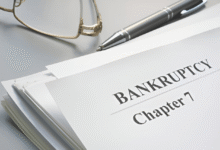What Should Small Business Owners Know About Bankruptcy?

Bankruptcy is a term that strikes fear into the hearts of small business owners. It’s often seen as a last resort, a financial tragedy that signals the end of a business venture. However, understanding bankruptcy and its implications is crucial for entrepreneurs facing financial challenges. This article will explore what small business owners should know about bankruptcy, covering types, signs, processes, and alternatives.
Importance of Understanding Bankruptcy for Small Business Owners
Small business owners often invest significant time, effort, and capital into their ventures. Knowing about bankruptcy can be a lifeline in times of financial distress, offering options for recovery and a chance to rebuild.
Types of Bankruptcy
Chapter 7
Chapter 7 bankruptcy, also known as liquidation bankruptcy, involves the sale of assets to repay creditors. Small businesses may choose this option if the business is not viable for continued operation.
Chapter 11
Chapter 11 bankruptcy is a reorganization bankruptcy commonly used by businesses. It allows for the restructuring of debts while the business continues operations. More giant corporations often employ this chapter.
Chapter 13
Chapter 13 bankruptcy is designed for individuals, including sole proprietors. It enables the creation of a repayment plan to settle debts over a specific period, usually three to five years.
Signs That Your Business May Be Headed Towards Bankruptcy
Declining Revenue
A noticeable decrease in revenue can be an early warning sign. Small business owners should monitor their financial statements regularly and take proactive measures if revenue begins to decline.
Increasing Debt
Accumulating debt beyond manageable levels is a red flag. Entrepreneurs must be vigilant about their debt-to-income ratios and take corrective actions before it becomes overwhelming.
Legal Issues
Facing legal challenges or being sued by creditors can escalate financial troubles. Seeking legal advice early on can help in navigating these complexities.
Bankruptcy and Small Business Debts
Understanding how bankruptcy impacts different types of debts is crucial. While some debts may be discharged, others may require repayment. Consulting a financial advisor is essential for navigating this intricate landscape.
The Bankruptcy Process
Filing for Bankruptcy
Initiating the bankruptcy process involves filing a petition with the bankruptcy court. This marks the official start of proceedings and triggers an automatic stay, halting creditor actions.
Meeting with Creditors
A meeting with creditors, known as the 341 meeting, provides an opportunity to discuss the business’s financial situation. Transparency is critical during this process.
Court Proceedings
The court evaluates the business’s financial situation and determines the most suitable bankruptcy chapter. The process varies based on the type of bankruptcy filed.
Impact on Business Operations
Temporary Halt in Operations
Bankruptcy may necessitate a temporary pause in business operations. Entrepreneurs must develop strategies to minimize disruption and communicate effectively with stakeholders.
Reorganization Strategies
For businesses filing Chapter 11, reorganization is a crucial element. This involves developing a stronger plan to emerge from bankruptcy with a sustainable business model.
Protecting Personal Assets
Separation of Business and Personal Assets
One of the advantages of specific business structures, like limited liability companies (LLCs), is the separation of personal and business assets. This can shield personal assets from business debts.
LLC Benefits
Choosing an LLC structure provides liability protection for owners, ensuring that personal assets remain unaffected by the business’s financial struggles.
Credit Score and Future Borrowing
Rebuilding Credit After Bankruptcy
While bankruptcy impacts credit scores, it’s not a permanent stain. Small business owners can take steps to rebuild credit over time, demonstrating financial responsibility.
Impact on Future Loans and Credit
Securing loans or credit post-bankruptcy may be challenging initially. However, a well-executed recovery plan and responsible financial management can gradually restore trust with lenders.
Alternatives to Bankruptcy
Debt Restructuring
Exploring options like debt restructuring allows businesses to negotiate with creditors, potentially lowering interest rates or extending payment terms.
Negotiating with Creditors
Open communication with creditors can lead to mutually beneficial agreements. Many creditors prefer negotiating a repayment plan over resorting to bankruptcy.
Financial Counseling
Seeking the assistance of financial counsellors can provide valuable insights. These professionals can guide budgeting, debt management, and financial planning.
Read More: Bankruptcy and Taxes: Sorting Out the Liabilities
Legal Considerations
Hiring a Bankruptcy Attorney
Navigating bankruptcy proceedings requires legal expertise. Small business owners should consider hiring a bankruptcy attorney to ensure compliance with legal requirements.
Understanding Legal Obligations
Being aware of legal obligations throughout the bankruptcy process is crucial. Failing to meet these obligations can result in complications and delays.
Case Studies
Successful Recovery Stories
Examining successful recovery stories can inspire hope and provide practical insights into overcoming financial challenges.
Learning from Others’ Experiences
Understanding the experiences of businesses that faced bankruptcy can offer valuable lessons. Learning from both successes and failures is essential for informed decision-making.
Preparing for the Future
Implementing Better Financial Management Practices
Learning from past financial challenges, small business owners can implement improved financial management practices to avoid future crises.
Creating an Emergency Fund
Establishing an emergency fund is a proactive measure that can provide a financial cushion during unforeseen circumstances, reducing the risk of bankruptcy.
Resources for Small Business Owners
Government Assistance Programs
Various government programs offer support to small businesses facing financial difficulties. Exploring these resources can provide relief and assistance.
Non-profit Organizations Offering Support
Non-profit organizations supporting small businesses may offer grants, counselling, and other forms of assistance.
Common Misconceptions About Bankruptcy
Dispelling Myths
Addressing common misconceptions about bankruptcy is essential for informed decision-making. Dispelling myths can help small business owners approach the process with greater clarity.
Clarifying Misconceptions
Providing clear and accurate information to counter misconceptions ensures entrepreneurs make decisions based on facts, not fears.
Read More: Bankruptcy and Retirement: Planning for the Future
Conclusion
In conclusion, bankruptcy is not the end but a chance for a new beginning. Small business owners should approach it resiliently, seeking professional advice and exploring alternatives. By understanding the process, protecting personal assets, and learning from others’ experiences, entrepreneurs can navigate bankruptcy challenges and emerge stronger.
FAQs
Is bankruptcy the only option for struggling businesses?
Bankruptcy is one option, but alternatives like debt restructuring and negotiation with creditors should be explored first.
How long does bankruptcy stay on a credit report?
The impact of bankruptcy on a credit report typically lasts for seven to ten years, depending on the type of bankruptcy.
Can personal assets be protected during a business bankruptcy?
Choosing a business structure like an LLC can help protect personal assets from debts.
What role does a bankruptcy attorney play in the process?
A bankruptcy attorney provides legal guidance, ensuring compliance with court procedures and obligations.
Are there government programs to assist small businesses facing bankruptcy?
Yes, various government assistance programs provide support to struggling small businesses.











